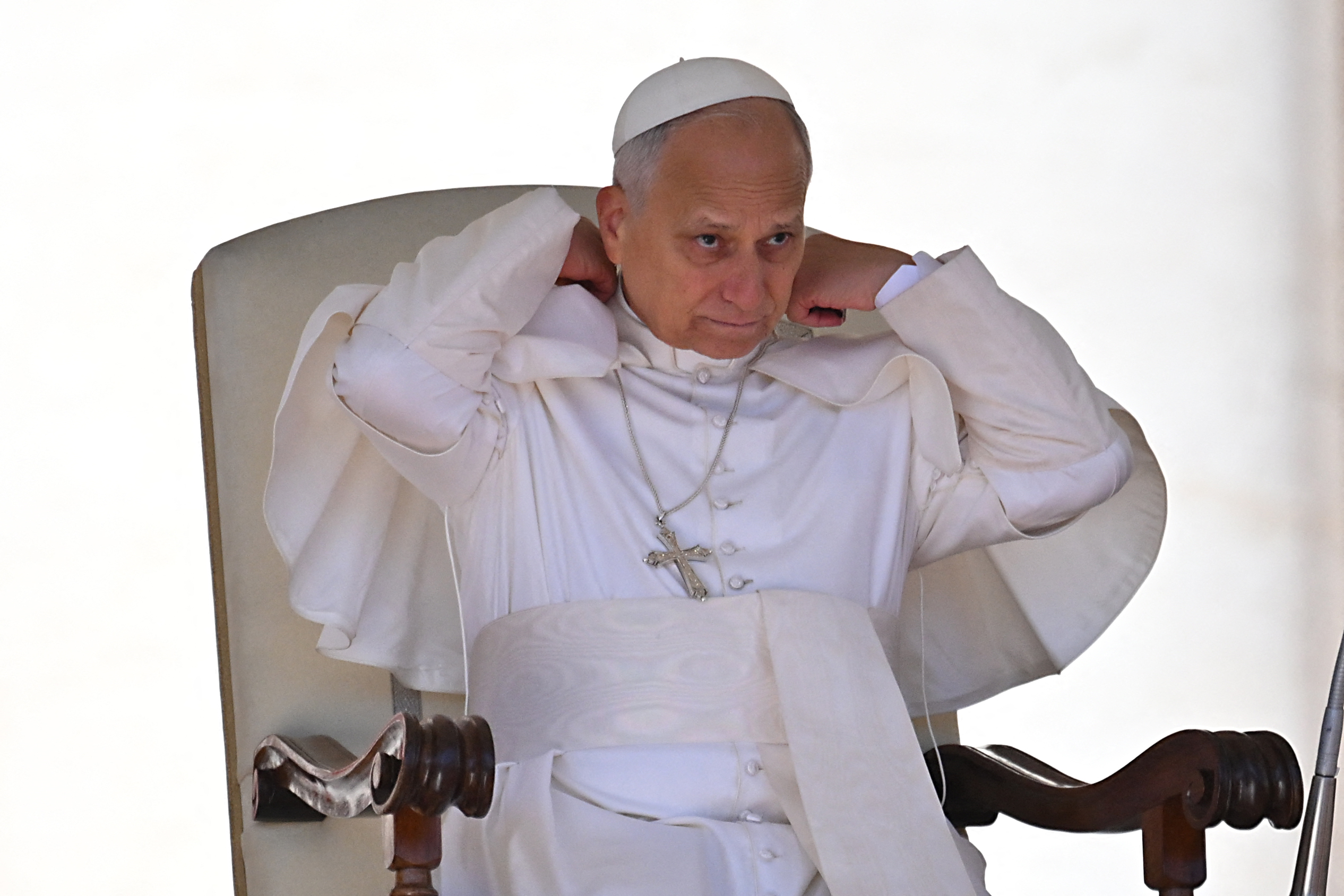The Israeli government has issued a sharp rebuke of the Holy See’s assessment of its actions in Gaza – a notable intervention in the diplomatic arena.
Exiting the residence at Castel Gandolfo on Tuesday afternoon, Pope Leo was accosted by the now customary gaggle of journalists, all eager to pose him a question. While his remarks in English refraining from commenting on American political matters caught the limelight, another, briefer comment was equally as momentous.
It was Leo’s response to a question about Israel’s condemnation of an interview given by Cardinal Secretary of State Pietro Parolin on the current situation in the Holy Land and Gaza.
“I prefer not to comment further but the cardinal expressed the Holy See’s opinion in this matter very well,” said Leo.
So what had caused the uproar?
On Monday, Parolin gave an interview to the Vatican’s in-house media outlets reflecting on the second anniversary of the October 7 attacks by Hamas. Lamenting the attack, Parolin described it as a massacre, saying: “The brutal violence against children, women, young people, the elderly – there can be no justification for it. It was a shameful and, I repeat, inhuman massacre.”
The cardinal – Secretary of State since late 2013 – continued by additionally criticising Israel’s own actions in Gaza also as a “massacre". Parolin noted: “It seems evident that the war waged by the Israeli army to eliminate Hamas militants disregards the fact that it is targeting a largely defenceless population, already pushed to the brink, in an area where buildings and homes are reduced to rubble.
"A simple look at aerial images is enough to understand what Gaza looks like today. It is equally clear that the international community is, unfortunately, powerless and that the countries truly capable of exerting influence have so far failed to act to stop the ongoing massacre.
"I can only repeat the very clear words spoken by Pope Leo XIV on July 20: 'I renew my appeal to the international community to observe humanitarian law and to respect the obligation to protect civilians, as well as the prohibition of collective punishment, the indiscriminate use of force and the forced displacement of the population.' These are words that are still waiting to be welcomed and understood.”
Israel’s embassy to the Holy See was swift to reply, and on Tuesday, 7 October, issued a statement roundly condemning Parolin’s words:
“The recent interview with Cardinal Parolin, though surely well-intentioned, risks undermining efforts to both end the war in Gaza and counter rising antisemitism. It focuses on criticizing Israel while overlooking Hamas’ continued refusal to release hostages or stop the violence.
"Most concerning is the problematic use of moral equivalence where it does not belong. For example, the application of the term 'massacre' to both Hamas’ genocidal October 7th attack and Israel’s legitimate right to self-defense. There is no moral equivalence between a democratic state protecting its citizens and a terrorist organization intent on killing them. We hope that future statements will reflect this important distinction.”
Israel’s actions in Gaza have earned criticism even recently at the United Nations, and some – including Catholic clergy – have attested that the nation is committing “genocide". Parolin himself has previously shied away from using such a term, saying only last month that “the elements must be studied well to make such statements".
Hence for the cardinal Secretary of State to now deliberately use the word “massacre” reveals the development of the Holy See’s concern about the situation in Gaza.
The Israeli Embassy’s public response sought to return fire onto the Holy See, via the person of Cdl. Parolin, but it seems that the Embassy has been met with the impasse of the Pontiff himself.
By defending his Secretary of State in such a manner, Leo both warned Israel of the unwavering nature of the Holy See’s stance on the matter, and shut down the debate without directly fanning the flames any further himself.
For his own part, Leo issued a call to peace: something which has been a constant theme since his May 8 election to the papal throne.
“These have been two very painful years,” he told journalist yesterday, just prior to being asked about the Parolin interview. “Two years ago, 1,200 people were killed in a terrorist attack. We must think about how much hatred exists in the world and begin to ask ourselves what we can do.
"In two years, around 67,000 Palestinians have been killed. We must reduce hatred, we must rediscover the ability to dialogue, to seek peaceful solutions.”
The Holy See promotes the two-state solution for Israel and Palestine. Addressing the United Nations in July, the Holy See’s representative Archbishop Gabriele Caccia reiterated this fact: “The Holy See remains convinced that the two-state solution, based on secure and internationally recognised borders, is the only viable and equitable path toward a just and lasting peace.
"To support this vision, the Holy See has already taken meaningful steps. It formally recognised the State of Israel through the 1993 Fundamental Agreement and the State of Palestine through the 2015 Comprehensive Agreement.
"It continues to uphold the inalienable rights of the Palestinian people, including the right to self-determination. The Holy See supports their legitimate aspirations to live in freedom, security, and dignity within an independent and sovereign State.”
Then when Leo XIV met with Israeli President Isaac Herzog in early September, this stance of the Holy See was again made clear, as outlined in the unusually detailed statement summarising the private meeting.
The Latin Patriarch of Jerusalem, Cardinal Pierbattista Pizzaballa, has been a leading voice in the region. While not advocating for any particular party but for the implementation of peace and rebuilding of family life across the board, he has previously said that the region needs “new leadership with vision” in both the political and religious arenas before peace will take place.
Following the possibility of a peace deal over the past weekend, Pizzaballa again wrote to the Diocese of Jerusalem welcoming any realistic development towards peace, but urging against complacency.
“We must remain realistic,” he said. “Much remains to be done to give Gaza a peaceful future. The cessation of hostilities is only the first – necessary and indispensable – step on a treacherous path in a context that remains problematic.”
The Italian cardinal – who was deemed by some to be papabile during the May conclave – placed any hope for realistic solutions in Christ: a style which has truly marked him out from many in the often polemic discussions regarding Israel and Gaza in recent years.
He wrote: “In this dramatic time, our Church is called with renewed energy to witness her faith in the passion and resurrection of Jesus. Our decision to remain, when everything urges us to leave, is not a challenge but an act of love. Our denouncing is not an offence to any party but a call to dare a different path from the reckoning. Our dying took place under the cross, not on a battlefield.”
Pizzaballa has not been afraid to make criticisms of both sides during the conflict, and it seems that Leo XIV is keen to take an equally firm stance regarding the Holy See’s position, even in the face of direct Israeli criticism.
RELATED: Cardinal Parolin condemns Israel’s war in Gaza as an 'ongoing massacre'
Photo: Pope Leo XIV blesses the crowd during the weekly general audience at St Peter's Square in the Vatican, 8 October 2025. (Photo by ANDREAS SOLARO/AFP via Getty Images.)
Michael Haynes is a self-employed English journalist and part of the Holy See Press Corps. He also writes at his site Per Mariam

















